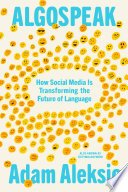Algospeak by Adam Aleksic — Book Review
In an age where algorithms dictate much of our daily communication, Adam Aleksic’s “Algospeak” poses a question that resonates deeply: Are we losing our ability to communicate authentically, or are we simply evolving? It’s a question that echoes through the corridors of social media platforms, reverberates in the algorithms of search engines, and reverberates in our interactions. Algospeak, a term that Aleksic uses to describe the language shaped by algorithms, is both a phenomenon and a reflection of our times. It’s a journey into the linguistic evolution driven by technology, and it challenges us to reflect on what we gain and what we lose in the process.
“Algospeak” is a book that carries an intellectual yet accessible vibe, striking a balance between academic rigor and conversational tone. Aleksic’s writing is neither overly technical nor overly simplistic, making it suitable for a wide range of readers. Whether you’re a tech enthusiast, a linguist, or a casual reader curious about the intersection of language and technology, this book offers something for everyone. The pacing is deliberate, allowing readers to digest complex ideas without feeling overwhelmed, yet brisk enough to maintain engagement. Aleksic manages to capture the essence of our digital age with a mood that is both reflective and forward-looking, appealing to those who are not only interested in understanding the current landscape but are also curious about what lies ahead.
At its core, “Algospeak” explores how algorithms influence language and communication. Aleksic delves into the intricacies of how platforms like Twitter, Facebook, and YouTube shape the way we express ourselves. He argues that these platforms, with their algorithmic filtering and content prioritization, have led to the emergence of a new linguistic paradigm. This paradigm, he suggests, is characterized by brevity, ambiguity, and at times, obfuscation—essentially, a language tailored to avoid censorship and maximize engagement. Aleksic’s exploration is thorough, touching upon the implications of algospeak on freedom of expression, the spread of misinformation, and the evolution of language itself. He provides a nuanced analysis of how algospeak has redefined communication, not only altering how we convey information but also impacting how we perceive and understand it.
Connecting Aleksic’s insights to broader themes, one can’t help but draw parallels with current events and other works on digital communication. The rise of algospeak is reminiscent of George Orwell’s “Newspeak,” where language is manipulated to control thought. However, unlike Orwell’s dystopian vision, algospeak is not imposed by a totalitarian regime but is rather an organic response to technological constraints and incentives. This raises questions about agency and autonomy in the digital age. Furthermore, Aleksic’s examination of the spread of misinformation through algospeak resonates with ongoing debates about the role of social media in shaping public discourse. As platforms grapple with the challenge of balancing free expression with the need to curb harmful content, “Algospeak” provides a timely and relevant perspective on the complexities involved.
Personally, “Algospeak” has prompted me to reconsider the way I engage with digital platforms. It is easy to overlook the subtle ways algorithms guide our interactions, often prioritizing convenience over clarity and depth. Aleksic’s work has heightened my awareness of the linguistic choices I make online and the potential implications of those choices. It has also encouraged me to be more critical of the information I consume, recognizing the filters through which it is presented. In a broader sense, “Algospeak” has reinforced the importance of maintaining a balance between embracing technological advancements and preserving the integrity of human communication. It serves as a reminder that while technology can enhance our ability to connect, it is ultimately our responsibility to ensure that those connections are meaningful and authentic.
In conclusion, “Algospeak” by Adam Aleksic is a must-read for anyone interested in the intersection of language and technology. It offers a fresh perspective on how digital platforms shape our communication and challenges us to reflect on the implications of these changes. Whether you’re a linguist, a tech enthusiast, or simply someone curious about the digital age, you’ll find value in Aleksic’s insightful analysis and thought-provoking arguments. In a world where algorithms increasingly mediate our interactions, “Algospeak” invites us to pause and consider the language we’re creating and the future we’re shaping. It’s a call to be mindful of the words we choose and the algorithms that influence them, urging us to navigate the digital landscape with both awareness and intention.

